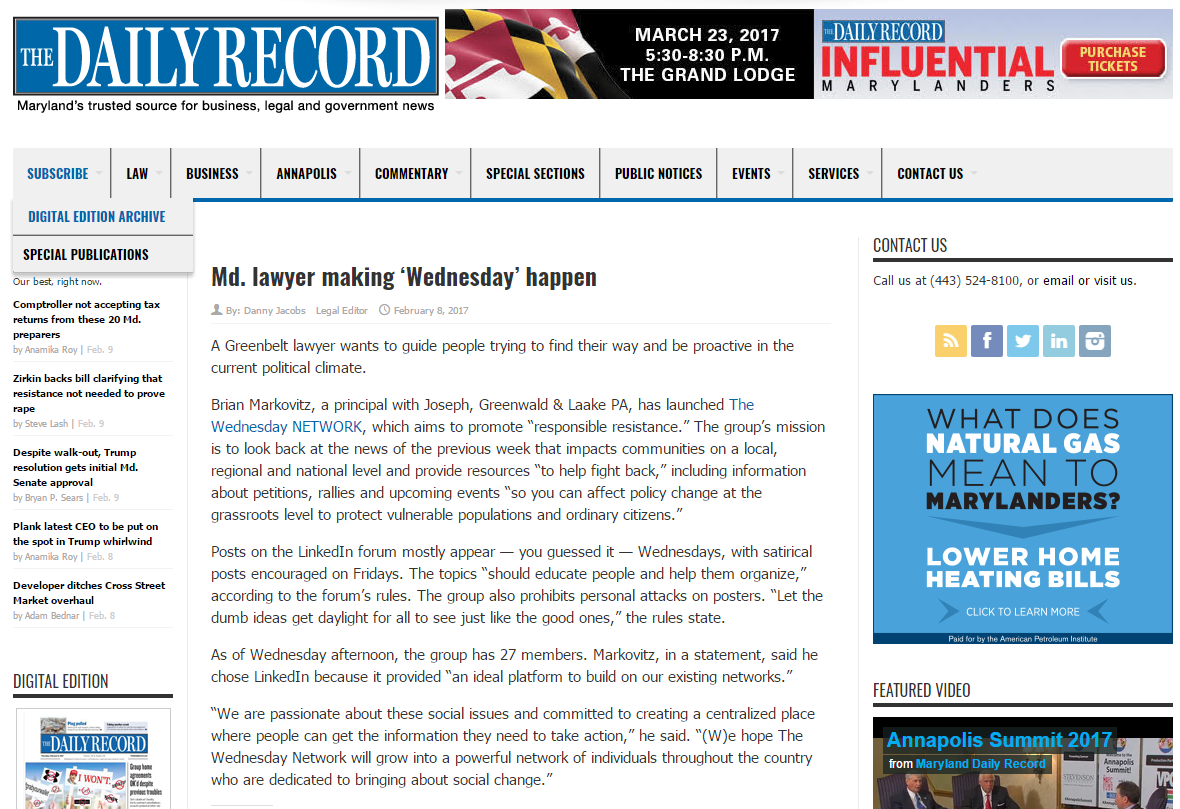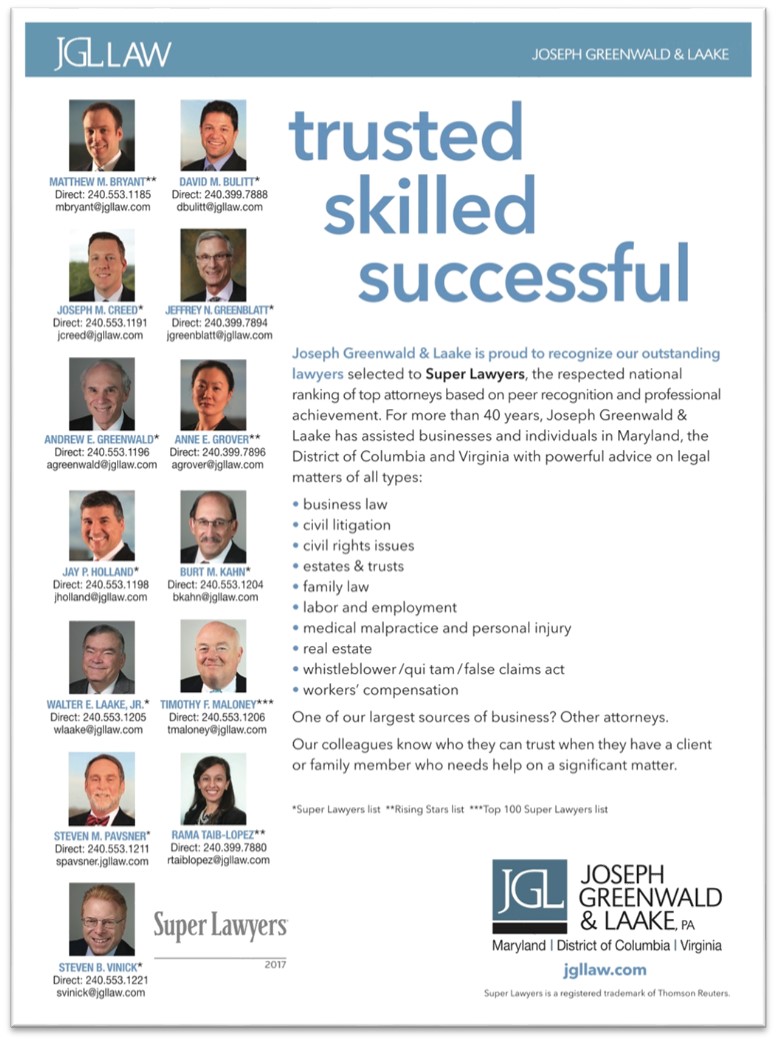Author: JGL Law
- Website
- https://www.jgllaw.com
Posts by JGL Law
The new collective bargaining agreement between Baltimore and its police is in the news. JGL’s Timothy Maloney weighs in here:
Why the future of police trial boards in Baltimore is not in a judge’s hands
JGL was well-represented at the Prince George’s County Economic Development Corporation’s Capitol Access Event! Paul Herrmann, JGL’s director of marketing, is pictured below with PGEDC President Jim Coleman, MD Secretary of Commerce Mike Gill as well as several PG business owners and elected officials.
Our Jay Holland was quoted twice in the news media last week on Trump’s travel ban. Check out both stories in the links below.
http://www.rawstory.com/2017/02/see-you-in-court-trumps-travel-ban-faces-legal-challenges-in-courts-across-the-us/
GREENBELT, MD., February — , 2017 — Joseph Greenwald & Laake P.A. is pleased to announce that Darin Rumer has been elected as an Income Partner and Matthew Focht has been elected as a Senior Counsel.
“At Joseph Greenwald & Laake, we take an intergenerational view of our talent and through that process we are thrilled to elevate Darin and Matt,” said Burt Kahn, Managing Director. “We are delighted that we have such a fine contingent of younger lawyers, and we want to reward the excellent work they have done in serving our clients.”
Darin Rumer is a member of the Firm’s Family Law Group, where he regularly advises clients on a variety of family law matters, including child custody and divorce, separation agreements, child support and alimony issues, property distribution issues, and domestic violence. Darin received his B.A. in 1997 from Clemson University, and his J.D. in 2000 from Regent University School of Law.
Matthew Focht is a member of the Firm’s Personal Injury Group and handles all aspects of civil litigation at the state and federal level in Maryland and the District of Columbia with an emphasis on plaintiff’s-side personal injury cases. He is a 1995 graduate of Loyola College in Maryland. He earned his law degree in 2001 from the Catholic University of America, Columbus School o
About Joseph Greenwald & Laake
For more than 40 years, Joseph Greenwald & Laake has worked with individuals and businesses in Maryland, the District of Columbia and Virginia taking on the most complex of legal issues with sophisticated counsel and a personal touch. JGL serves clients in virtually all areas of the law.
Contact:
Paul Herrmann
301-477-2500
On Tuesday, February 7, 2017, at noon, shareholder David Bulitt will be the featured speaker at a luncheon meeting of the Bar Association of Frederick County, Md. The event will take place at the Delaplaine Arts Center, 40 South Carroll Street in Frederick.
David will discuss the balance that he has aimed for between practicing law as a divorce lawyer, being a father of four daughters, and being a novelist, and why he decided to kick off a writing career at age 50.
David will speak about his new novel, BECAUSE I HAD TO, which was published in late January, 2017 and has already received dozens of five star reviews from readers and reviewers alike. Alternatively told from the perspectives of a 23 year old woman and an over 50 divorce lawyer, the novel draws heavily on David’s 30 years of experience raising children, one of them with severe mental health issues, as well as his representing clients in the area of family law. David’s first novel, CARD GAME, was published in 2015.
We are pleased to announce 13 of our attorneys have been named Super Lawyers. Only 5% of attorneys nation wide make this annual list. Click below for more details!
INTRODUCTION
The damages sustained by a seriously injured child do not just relate to the child himself. They also affect the altered lifestyles of siblings and parents and encompass a whole host of experts who are necessary to explain, prognosticate, and portray what the child and the family’s life will become. This paper will concentrate on the psychological and emotional damages and not on the economic loss. Obviously in fully presenting damages a life care plan and economist are essential.
THE CHILD
A catastrophic injury may appear to speak for itself; however, to portray the full scope of the situation, the attorney needs to understand the child’s relationship to himself and to the world around him.
There are two types of injuries that may exist either individually or together: functional and emotional. This will depend on whether the child was born with the severe damage, perhaps because of obstetrical malpractice, or born normal and have suffered some catastrophic incident (medical or otherwise) subsequently.
Catastrophic injuries come in varying degrees. There is the child who has suffered total brain damage and is incapable of understanding his situation and yet still feels pain. There is the child who has suffered a catastrophic injury which has left his or her brain function in tact. One must comprehend how the child copes with what is wrong and why he is different. In the case of a severe brachial plexus injury (as a result of the failure to appropriately address a shoulder dystocia) to quadriplegia, (from a gymnastics incident or perhaps an auto accident), the child may fully be aware of the injury he has suffered. What may not be evident to him (depending upon his age) is the depth of the emotional damage and feelings that he will have after he realizes how he must live the rest of his life. This will be brought to light dramatically by his or her interaction or the lack thereof with peers and may lead to the destruction of or the inability to create a positive self-image.
The child who has been the victim of severe trauma has many emotional and psychological needs. This encompasses the need to understand and to learn to express feelings – sadness, fear of the future and their sense of loss[1]. These realizations pass through different stages.
Anger may arise from different feelings including frustration, fear, helplessness, and humiliation.[2] This anger may cause the child to react in different ways. Anger may have its good and bad sides. When it is directed internally it can lead to depression. When it is turned outward it may motivate the child to achieve.[3] In those cases where the child can achieve those successes they will demonstrate to a jury the strength of the human spirit. We all have a special feeling for those who fight to improve themselves especially when they are facing almost insurmountable odds.
Other stages that the child will go through are depression and adoption. Adoption may lead to the loss of self-esteem as the child feels helpless. The child may rethink his self-image in light of the critical changes that have taken place in his life, in his surroundings, and in his abilities.[4]
In the appropriate case, where the child has a brain function and has achieved, the attorney should resist the impulse to dwell on the negative. In a case involving a high school student who became a quadriplegic because of alleged negligence on the part of an art teacher who was made the gymnastics coach the jury was addressed as follows:
“. . . Peter has been able to do a lot. He has been able to use his hands to some extent. The evidence will show that he has been able to do basic things that he could not do after he was hurt, like brush his teeth or open a box of cereal. He can do those and we are going to those. And we are going to show you a videotape of what it is like in the day of the life.”
Of course, it is important to advise the jury also of the extent of the injury:
“. . . Peter became, at that time, a quadriplegic. That meant that most of his body was not working. It means his arms were not working and his legs were not working and his bladder was not working, and he had no control over his body functions. And most of that, a lot of that, still exists today.”
THE FAMILY
It is easy to concentrate on the injuries of a severely injured child, but one must also examine the family relationship and how it has changed. How do his brothers and sisters and parents handle what has happened. How do his siblings react to the fact that most of the parents’ attention and time is spent on the victim.
Many parents of brain injured children want to take care of them at home, however, what happens when the child grows and reaches puberty? What happens when neither mother nor father can physically handle such as bathing? To accurately portray the totality of the care that the child will need, appropriate experts, neurologists, orthopedists, rehabilitation physicians and life care planners need to be consulted.
The emotional damage to a family can also be severe, from depression, to the lack of understanding of younger siblings about their relationship to the injured child. All of this may add to the victim’s pain and suffering. A psychological profile of the family can put things in perspective.
A neuropsychologist will need to meet with the child and outline the types of therapies that will need to cope with rejection as well as the uncomfortable situations that will be regularly encountered when confronted by staring strangers. Finally, the family will need help in handling those strangers who cannot resist the temptation to inquire as to why the child has this problem.
THE EXTENT OF THE INJURY
The child’s ability to be functionally educated may be directly tied to a difference between performance skills and abilities. The results of testing will help the life care planner and the neuropsychologist, outline the type of therapies the child will need to reach his or her maximum potential. The more special help the child needs, the greater the cost.
An issue that must be addressed head-on is the issue of life expectancy. There are studies that have been done dealing with life expectancy based upon such things as reaching certain milestones and the child’s ability to do certain functional things. One must be careful in examining the literature to determine its age and its scope. There have been studies done in England, California, Australia, and Illinois. The longer a seriously disabled child lives the longer the life expectancy seems to be. The attorney handling these cases must look carefully into the qualifications of the people doing these studies, the data bases from which the statistics are taken, the error rate in the medical journals, whether these materials have been reviewed by statisticians as well as other issues. It is this writer’s belief that the child should be entitled to the best help and care available so that he or she can reach his or her maximum potential.
PRESENTING THE CHILD
It is important, for the child not only to be portrayed as he or she is, but how he or she will be in the future. The child may need several operations. How much hope and courage can the human spirit display operation after operation? How much optimism can the family instill in the child after he fails to improve after numerous medical procedures? Many children are scared when they go to the doctor. Imagine how they feel every time they return for surgery; how the parents feel every time they are given informed consent and told their child may not come out of the procedure alive.
There are many ways to portray the child in the courtroom: the “Day in the Life” film, still photographs, and the child him or herself. However, above all else, it is a sensitive and compassionate presentation, covering all of the aspects of the injured child’s present and future that will illustrate the best picture of what is and what can be.
ANDREW GREENWALD IS A PRINCIPAL IN A LAW FIRM OF JOSEPH, GREENWALD & LAAKE, P.A. AND ALSO A MEMBER OF THE BOARD OF THE BIRTH TRAUMA LITIGATION GROUP OF THE ASSOCIATION OF TRIAL LAWYERS OF AMERICA. HE CONCENTRATES HIS PRACTICE IN MEDICAL MALPRACTICE. HE HAS LECTURED IN THE AREAS OF OBSTETRICAL NEGLIGENCE, DISCOVERY AND HANDLING MEDICAL NEGLIGENCE CASES. HE HAS WRITTEN NUMEROUS ARTICLES IN TRIAL MAGAZINE ON NEGLIGENCE ISSUES.
[1] K. K. Graham, Crisis Intervention with Victims of Trauma (remarks at the 1984 Mid-America Symposium on Trauma, Nov. 9-11, 1984, Dearborn, Mich.)
[2] M. Hanak & A. Scott, Spinal Cord Injury: An Illustrated Guide for Health Care Professionals 2 (1983).
[3] S.L. Roberts, BEHAVIORAL, CONCEPTS AND THE CRITICALLY ILL PATIENT (1976).
[4] G. Scipien, COMPREHENSIVE PEDIATRIC NURSING (1975).





